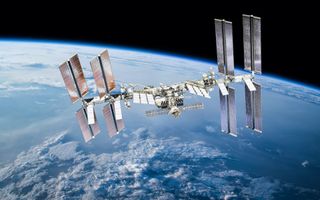Smoke sets off alarms on the International Space Station
It's not the first cause for alarm, and it likely will not be the last.

Alarms blared aboard the Russian side of the International Space Station (ISS) early Thursday (Sept. 9), and the crew reported seeing smoke and smelling burnt plastic, according to news reports.
The incident occurred in Russia's Zvezda module as the station's batteries were recharging, Russia's space agency, Roscosmos, reported, according to the BBC. The systems are now back to normal, and the crew has returned to "regular training," Roscosmos said. The ISS crew activated air filters, which cleared the air, according to the Associated Press.
Though this incident has been resolved, it wasn't the first time the ISS has dealt with worrisome events. And it likely won't be the last.
Related: International Space Station at 20: A photo tour
Much of the equipment aboard the ISS is outdated and could lead to irreparable failures, Vladimir Solovyov, chief engineer of rocket and space corporation Energia, told state media on Sept. 1, according to the BBC. At least 80% of in-flight systems on the Russian segment of the ISS have expired, Solovyov said.
On Aug. 30, Russian cosmonauts discovered cracks on the ISS' Zarya module, which was the first ISS component to be launched into orbit, in 1998, Live Science previously reported. Solovyov told Russian state-owned news agency RIA that these fissures could begin to spread over time. He also previously warned of an "avalanche" of broken equipment after 2025, according to Reuters.
The ISS is aging, and it can't last forever; but how it will eventually retire is unclear. If humans don't eventually grant the station retirement, such as by de-orbiting it, the ever-threatening risk of impacts from space debris and micrometeorites will lead to its demise, according to Live Science sister site Space.com.
Sign up for the Live Science daily newsletter now
Get the world’s most fascinating discoveries delivered straight to your inbox.
Still, the ISS is cleared to operate through at least December 2024 and from a technical standpoint, to fly until the end of 2028, NASA officials previously told Space.com. "Additionally, our analysis has not identified any issues that would preclude us from extending beyond 2028 if needed."
A 6-hour spacewalk to work on a recently-docked Russian Nauka science lab that is scheduled for Thursday is still a go, according to the Associated Press.
Originally published on Live Science.

Yasemin is a staff writer at Live Science, covering health, neuroscience and biology. Her work has appeared in Scientific American, Science and the San Jose Mercury News. She has a bachelor's degree in biomedical engineering from the University of Connecticut and a graduate certificate in science communication from the University of California, Santa Cruz.
Most Popular



